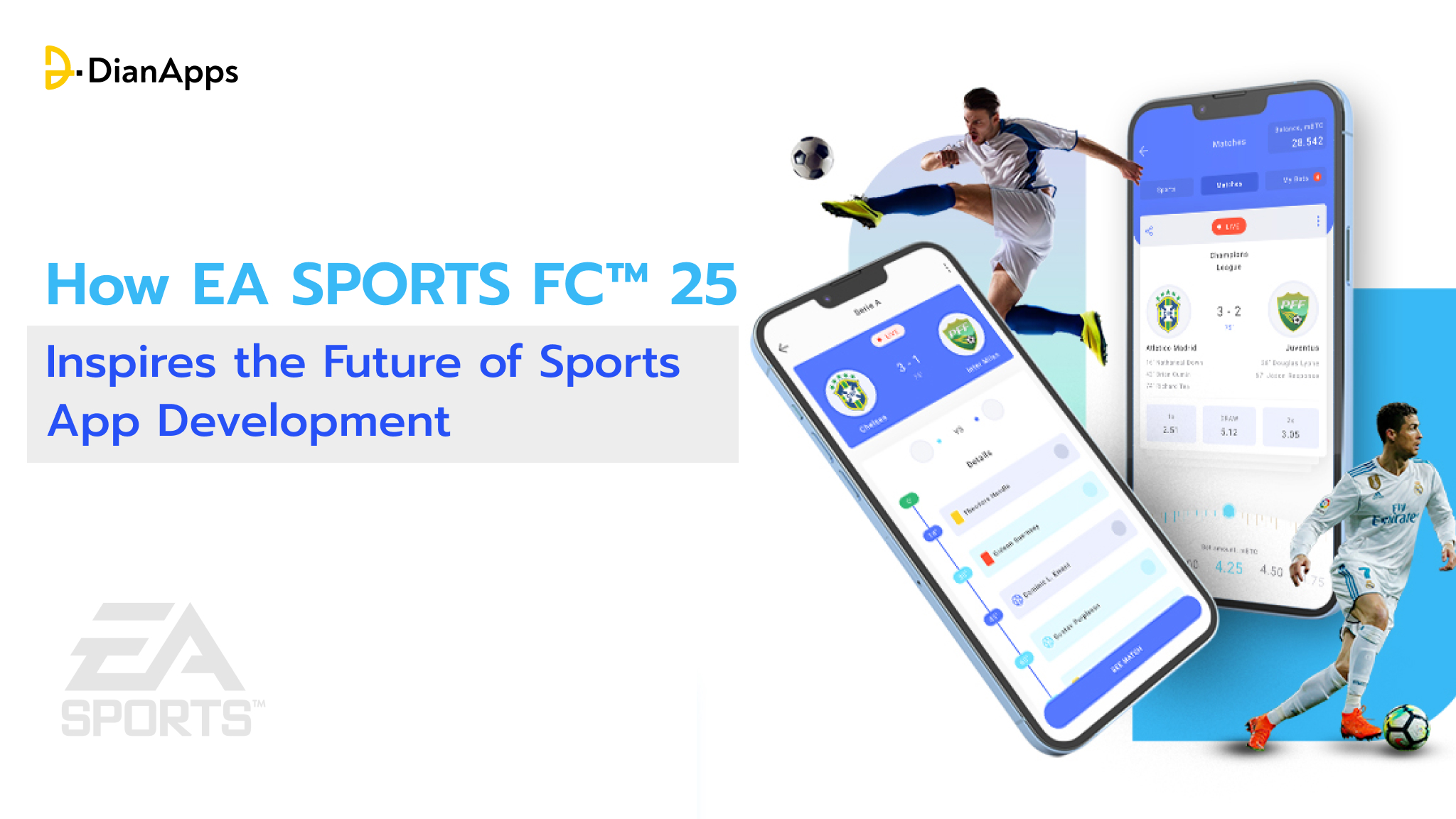How EA SPORTS FC™ 25 Inspires the Future of Sports App Development?
Sports gaming is evolving at an unprecedented pace, and EA SPORTS FC™ 25 is leading the charge. With groundbreaking features like AI-driven gameplay mechanics, immersive career modes, and next-gen graphics, this latest instalment isn’t just redefining virtual football—it’s setting new benchmarks for sports app development.

But what makes FC 25 a game-changer? How do its hyper-realistic AI, real-time updates, and advanced social integrations inspire the next wave of sports apps, fitness platforms, and fan engagement tools?
As Google searches for “best sports apps,” “AI in sports,” and “real-time sports tracking” continue to surge, developers and tech enthusiasts are looking for fresh ideas to bridge the gap between gaming, fitness, and real-world sports experiences.
In this blog, we’ll explore how EA SPORTS FC™ 25 is paving the way for the future of interactive sports applications—from AI-powered training systems to immersive multiplayer fan engagement platforms.
What You’ll Learn:
- How FC 25’s FC IQ is revolutionizing AI-driven sports analytics
- The role of Rush Mode and Clubhouse in shaping next-gen multiplayer sports apps
- Why real-time updates in Career Mode are setting new standards for fantasy sports apps
- How ray tracing and enhanced visuals are pushing the boundaries of sports AR/VR experiences
Ready to explore the tech that’s redefining the future of sports app development services? Let’s dive in.
Explore fantasy sports trends and challenges before proceeding ahead!
AI & Machine Learning in Sports Apps: The FC IQ Revolution
One of the standout innovations in EA SPORTS FC™ 25 is FC IQ, a next-gen AI system that transforms player decision-making, movement, and in-game tactics. This technology doesn’t just enhance virtual football—it sets a new benchmark for Best AI sports apps that leverage machine learning for real-time adaptability.
Want to know the cost of sport apps like CBS Sports? Here go ahead and get started with building an epic Football platform.
How AI-Powered Gameplay is Redefining Sports Apps?
With FC IQ, players respond dynamically to in-game situations, making tactical adjustments based on real-world football data. This level of intelligence isn’t just a gaming breakthrough—it’s an inspiration for AI-powered coaching apps, real-time sports analytics tools, and interactive training platforms.
Personalized Training & Performance Analysis
- Just like FC IQ adapts to player styles, AI-driven sports training apps can analyze user performance and offer customized training drills.
- Fitness and sports coaching apps can use machine learning to provide real-time feedback, injury prevention strategies, and skill improvement tips.
Predictive Game Analytics for Coaches & Fans
- Sports apps can integrate AI-powered predictive models to analyze team formations, forecast match outcomes, and suggest strategic decisions—mirroring FC IQ’s ability to simulate real-game scenarios.
- Fantasy sports platforms can leverage AI for player performance tracking, helping users make smarter lineup decisions.
Real-Time Adaptive Gameplay in Mobile Sports Apps
- Imagine a football or basketball training app that adjusts difficulty based on a player’s real-world skills and past performance, similar to how FC IQ enhances opponent AI.
- AI-powered simulations can create customized drills based on player weaknesses, offering a tailored progression system.
With AI-driven features like FC IQ, EA SPORTS FC™ 25 is pushing the boundaries of smart, adaptive gameplay. As Machine learning in gaming, real-time tracking, and predictive analytics continue to evolve, the next generation of sports apps, fitness platforms, and fantasy leagues will be more interactive, data-driven, and personalized than ever.
In the next section, we’ll explore how EA SPORTS FC™ 25 is setting new standards for user engagement and customization in sports apps.
Enhanced User Engagement Through Customization
Personalization is king, and EA SPORTS FC™ 25 takes it to the next level with features like Kit Designer, Stadium Editor, and The Clubhouse. These tools empower players to create their own unique gaming experiences, setting a new precedent for customization in sports app development.
Why Customization is Key to User Engagement
Modern sports fans crave personalized experiences, whether it’s customizing their favorite team’s kit, designing a stadium, or creating a unique player avatar. This level of control enhances emotional investment, leading to higher user retention and engagement.
Personalized Fan Engagement Platforms
- Just like FC 25 lets users customize their teams, sports fan apps can integrate similar features, allowing users to design custom jerseys, banners, and digital collectibles.
- Fantasy sports apps can take inspiration from FC 25 by offering personalized league setups, team branding, and interactive leaderboards.
Stadium & Arena Customization in Sports Apps
- Apps that cater to sports venues, e-sports leagues, or virtual stadium experiences can incorporate 3D customization tools for users to design their ideal arenas.
- Sports teams can use interactive stadium builders for fans to visualize seating arrangements, VR-based stadium tours, and even match-day experience customization.
The Rise of Social Sports Hubs
- EA SPORTS FC™ 25’s The Clubhouse allows players to connect and strategize, mirroring a trend in community-driven sports platforms.
- Fitness apps, training communities, and sports social networks can implement custom clubhouses, enabling users to form teams, share stats, and interact in real time.
From AI-generated avatars to custom sports hubs, FC 25 demonstrates how interactive design tools can shape user experiences.
As Google searches for “best fantasy sports apps,” “team customization tools,” and “personalized fitness coaching apps” rise, developers have an opportunity to tap into this demand by integrating hyper-personalized features into their sports applications.
Social & Multiplayer Innovation: The Future of Real-Time Sports Networking

One of EA SPORTS FC™ 25’s biggest advancements is its enhanced multiplayer and social integration, redefining how players connect, compete, and collaborate in real time. Whether it’s cross-play matchmaking, interactive Clubhouse hubs, or co-op challenges, these features mirror the growing demand for social-driven sports apps that blend gaming with real-world networking.
How Multiplayer Enhancements Are Shaping Sports App Development
Modern sports fans want seamless social experiences, whether it’s competing against friends, forming online leagues, or collaborating in real-time coaching apps. FC 25 introduces new social elements that set the foundation for future sports platforms.
Cross-Platform Sports Communities
- With FC 25’s enhanced cross-play, users can compete with friends regardless of their device—a trend that sports apps can leverage to increase engagement.
- Fantasy sports platforms and e-sports hubs can integrate universal matchmaking, ensuring real-time, device-agnostic competition.
Co-op Gaming & Live Challenges in Fitness Apps
- Multiplayer team-based training features, similar to FC 25’s online modes, can be introduced in fitness and sports apps.
Know why Fitness app development services important for businesses!
- Live leaderboards, real-time coaching, and AI-generated challenges can keep users engaged while working out or practicing sports.
Real-Time Communication & Clubhouse Model
- FC 25’s Clubhouse mode enables strategic discussions, team formations, and social networking, a model that can be applied to sports coaching, fan engagement, and live event interactions.
- Apps catering to coaches, fitness trainers, or athletes can use live chat, interactive coaching tools, and shared tactical boards to create immersive user experiences.
With real-time multiplayer, voice communication, and collaborative gaming features, EA SPORTS FC™ 25 highlights the importance of social engagement in modern sports apps.
As Google searches for “real-time multiplayer sports apps,” “social fitness challenges,” and “cross-platform sports games” increase, developers have an opportunity to redefine sports networking apps by focusing on interactive and competitive social experiences.
The Power of Next-Gen Graphics & AR/VR in Sports App Development

EA SPORTS FC™ 25 isn’t just a game—it’s a technological leap that showcases the future of visual realism and immersive experiences in sports apps. From lifelike animations to interactive AR overlays, these advancements open doors for a mobile app development company to create next-level digital experiences.
How Advanced Graphics & AR/VR Are Transforming Sports Apps
The rise of 4K visuals, motion capture technology, and AR/VR simulations is bridging the gap between digital and real-world sports experiences. Sports app developers can take inspiration from FC 25 to create immersive training programs, virtual match simulations, and interactive fan experiences.
Hyper-Realistic Motion & Physics for Training Apps
- EA SPORTS FC™ 25 uses HyperMotionV technology to capture realistic movement—something that fitness and training apps can incorporate for precision-based motion tracking.
- AI-driven sports simulations can mimic real-life player movements, offering interactive training regimens for athletes and casual players.
Augmented Reality (AR) for Real-Time Sports Analytics
- Sports tracking apps can integrate AR overlays that display real-time stats, biomechanical data, and movement analysis—much like FC 25 enhances in-game decision-making with dynamic player tracking.
- AR-based coaching tools can allow trainers to visualize player positioning, track improvements, and offer instant feedback during live practice sessions.
VR-Powered Fan Engagement & E-Sports Arenas
- The gaming industry’s push toward virtual stadiums opens doors for sports apps to offer VR-based live matches, interactive fan zones, and AI-powered match predictions.
- Fantasy sports and e-sports platforms can incorporate VR match simulations, letting users step into the action like never before.
As FC 25 leverages cutting-edge visuals and physics engines, sports app developers have an opportunity to create next-gen AR training tools, VR fan experiences, and motion-driven gameplay mechanics.
With rising Google searches for “best AR sports apps,” “VR football training,” and “AI-powered sports analytics,” the demand for ultra-realistic sports apps is at an all-time high.
Monetization & In-Game Economy: Lessons for Sports App Developers
EA SPORTS FC™ 25 has revolutionized revenue models with a mix of microtransactions, in-game purchases, and premium content. Its success highlights key monetization strategies that sports app developers can adopt to maximize user engagement and profitability.
Microtransactions & Virtual Goods
- What FC 25 Introduces: Players can purchase packs, coins, and customizations to enhance their gaming experience.
- How Sports Apps Can Use It:
- Fantasy sports platforms can introduce paid boosters, exclusive player cards, and league upgrades.
- Training apps can offer premium AI-driven insights, custom training plans, and performance tracking tools.
Subscription-Based Access & Exclusive Content
- What FC 25 Introduces: EA Play subscription unlocks early access, in-game rewards, and premium experiences.
- How Sports Apps Can Use It:
- Fitness and coaching apps can implement tiered subscriptions with benefits like 1-on-1 coaching, personalized workout plans, and AI-driven analytics.
Also read the best way to develop and launch a fitness app!
- Live sports apps can provide exclusive match streaming, behind-the-scenes content, and interactive fan experiences for subscribers.
Ad-Supported & Sponsorship-Driven Models
- What FC 25 Introduces: Integrated brand partnerships and sponsored in-game events enhance realism while generating revenue.
- How Sports Apps Can Use It:
- E-sports and fantasy leagues can collaborate with brands for sponsored challenges, leaderboard rewards, and branded virtual goods.
- Live-streaming sports apps can feature AI-driven ad placements and sponsorship deals based on user preferences.
The Future of Sports App Monetization
As FC 25 continues to drive record-breaking in-game spending, the sports app industry must evolve with hybrid revenue models that balance user experience and profitability. W
ith Google searches increasing for “best sports app subscriptions,” “fantasy sports monetization,” and “in-game purchases in fitness apps,” developers have an opportunity to redefine how users engage with digital sports content.
AI & Machine Learning: The Future of Smart Sports Apps
Artificial Intelligence (AI) and Machine Learning (ML) are redefining sports analytics, player performance tracking, and fan engagement. EA SPORTS FC™ 25 leverages advanced AI algorithms to enhance player decision-making, improve opponent intelligence, and create real-time adaptive gameplay.
AI-Driven Player Analytics & Coaching
- What FC 25 Introduces: AI-powered opponent tactics that adjust dynamically based on in-game performance.
- How Sports Apps Can Use It:
- Fitness and training apps can integrate AI-driven motion tracking to provide real-time feedback on posture, movements, and form.
- AI-powered coaching assistants can analyze player behavior and suggest personalized training plans for athletes.
Predictive Analytics for Fantasy & Betting Apps
- What FC 25 Introduces: Advanced statistical models predict player performance based on in-game metrics.
- How Sports Apps Can Use It:
- Fantasy sports apps can use ML to predict player form, injury risks, and match outcomes.
- AI-powered sports betting apps can leverage big data analysis for smarter betting recommendations.
Chatbots & AI-Powered Fan Engagement
- What FC 25 Introduces: AI-driven commentary and match insights enhance the gaming experience.
- How Sports Apps Can Use It:
- AI chatbots can provide real-time sports updates, match predictions, and interactive fan engagement through voice and text.
- AI-driven content personalization can tailor sports news and match highlights based on user preferences.
Continue reading how AI & ML are elevating mobile app development!
Cross-Platform Development: Ensuring Seamless User Experience
In today’s digital ecosystem, cross-platform accessibility is key to engaging a global sports audience. EA SPORTS FC™ 25 ensures a consistent experience across consoles, PC, and mobile, setting the benchmark for cross-platform sports app development.
Cloud-Based Gaming & Sports Streaming
- What FC 25 Introduces: Cloud-based gameplay ensures smooth transitions between devices.
- How Sports Apps Can Use It:
- Sports streaming apps can adopt cloud technology to allow users to watch live matches on any device with seamless switching.
- Fantasy and betting apps can use real-time cloud synchronization to enable instant updates on match stats.
Cross-Platform UI/UX Consistency
- What FC 25 Introduces: A unified interface for different platforms, maintaining visual and functional consistency.
- How Sports Apps Can Use It:
- Multi-device sports apps can prioritize responsive design, ensuring smooth experiences across mobile, web, and wearable devices.
- Augmented reality (AR) sports applications can leverage cross-platform frameworks like Flutter and React Native to streamline app performance.
Conclusion: The Road Ahead for Sports App Development
With EA SPORTS FC™ 25 pushing the boundaries of AI, AR/VR, cross-platform accessibility, and monetization, sports app developers have a blueprint for the future.
As searches for “AI-powered sports apps,” “best fantasy sports platforms,” and “cloud-based sports streaming” continue to rise, the industry is shifting towards more interactive, intelligent, and immersive digital experiences.
Key Takeaways for Sports App Developers:
- Leverage AI & machine learning for smarter analytics and personalized training.
- Adopt AR/VR to create immersive fan engagement and training simulations.
- Enhance monetization strategies with microtransactions, subscriptions, and sponsorships.
- Focus on cross-platform compatibility for seamless user experiences.
The future of sports apps isn’t just about watching games—it’s about living the game. Are you ready to build the next-gen sports experience?




